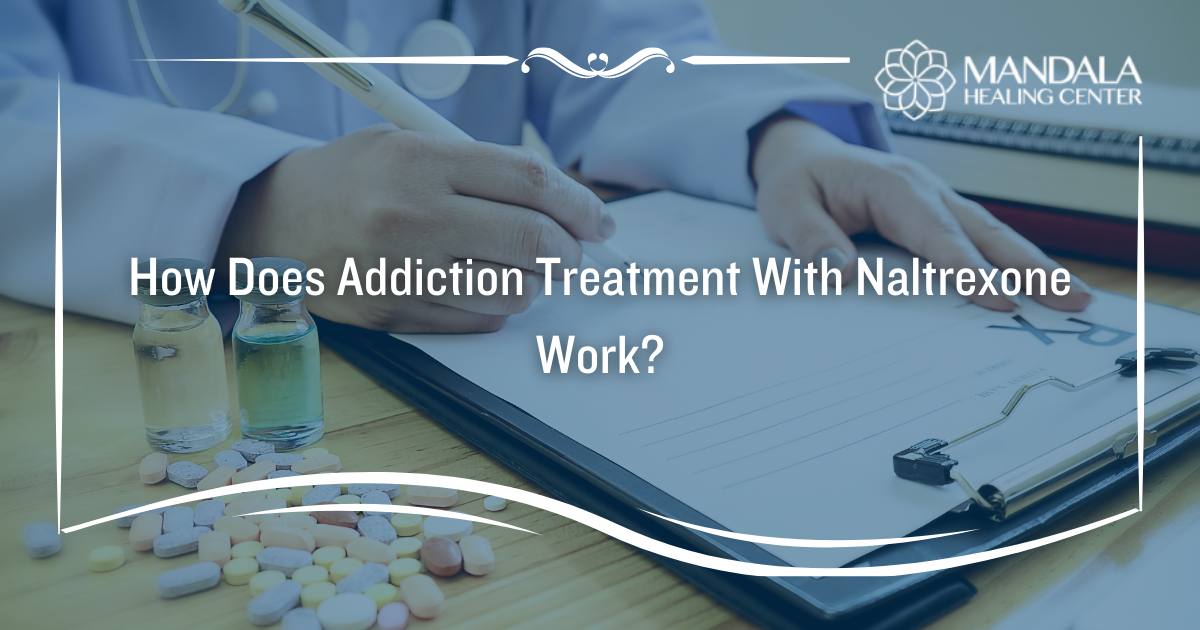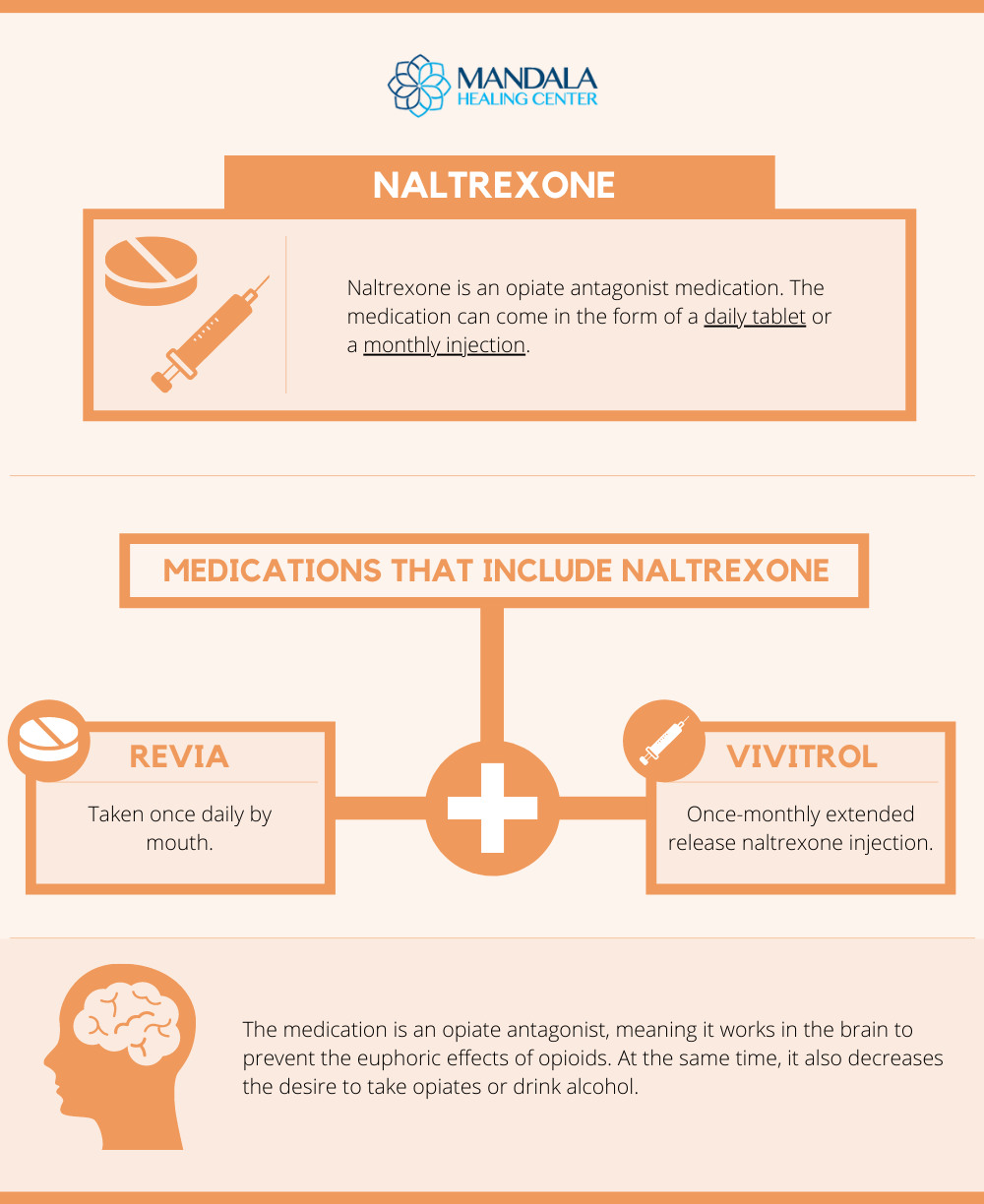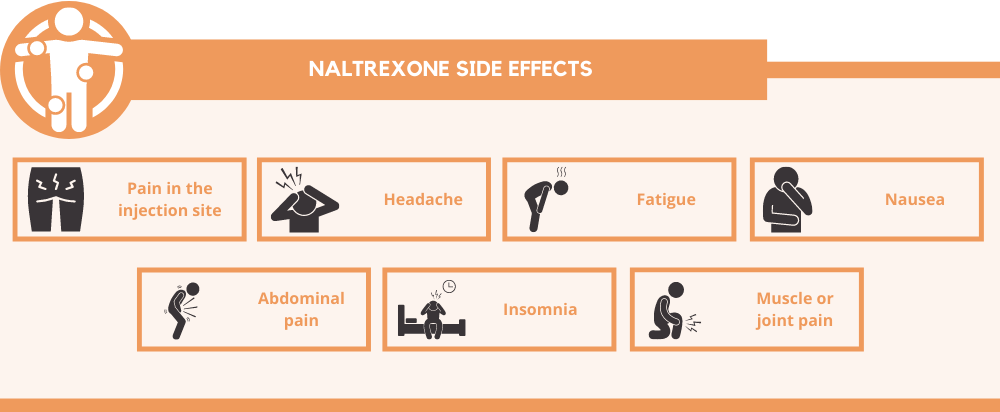Even with the help of a licensed medical facility, overcoming addiction isn’t easy. Drug and alcohol cravings can persist for several weeks, months, and even years after people first get sober, making it difficult to obtain long-term recovery. Fortunately, addiction treatment programs in West Palm Beach use FDA-approved medications like naltrexone to treat opioid and alcohol addiction.
Naltrexone is a medication that is used to treat opioid and alcohol addictions. The medication works by blocking the harmful effects of opioid drugs and balancing brain chemistry to reduce cravings and future drug use. When used as a part of an individualized treatment program consisting of behavioral therapy, counseling, and peer support, naltrexone can be highly effective at treating addiction.
What is Naltrexone?
Naltrexone is a medication that is approved by the U.S. Food and Drug Administration (FDA) and is used in medication-assisted treatment (MAT) programs to treat both opioid and alcohol use disorders. Treatment with naltrexone in West Palm Beach is always paired with individualized behavioral therapy and counseling.
Naltrexone can be prescribed and administered by any healthcare provider who is licensed to prescribe medications. However, patients must abstain from alcohol and opioids for a minimum of 7-20 days before starting the medication. Taking naltrexone prior to fully detoxing can result in precipitated withdrawal.[1]
How Does Naltrexone Treat Opioid Addiction?
Naltrexone is an opioid receptor agonist. This means it binds to opioid receptors in the brain without activating them and successfully blocks other opioid drugs from binding to these receptors, as well. By blocking opioid receptors, naltrexone is able to reduce drug cravings and prevent relapse in people who are addicted to opioid drugs such as prescription narcotics, heroin, or fentanyl.
A six-month study found that people who received naltrexone for opioid use disorder had a 55% decrease in drug cravings. Additionally, patients who took naltrexone in combination with a comprehensive treatment program were 17 times less likely to relapse compared to those who did not take naltrexone.[2]
How Does Naltrexone Treat Alcoholism?
Although naltrexone was originally intended to treat opioid use disorder, it is also effective at treating alcoholism. Naltrexone blocks the sedating effects of alcohol, preventing individuals from feeling the effects of drinking. This helps reduce the motivation to drink. Naltrexone is also thought to help balance chemicals in the brain that have been affected as a result of chronic drinking.
A six-month study found that people who took naltrexone in combination with therapy had 25% fewer heavy drinking days than people who did not take naltrexone.[3]
How is Naltrexone Administered?
There are three ways naltrexone can be administered: a daily pill, a monthly injection, or a quarterly/bi-annual implant. Patients who qualify for treatment with naltrexone in West Palm Beach can work with their prescribing doctor to determine which form of administration is right for them.
ReVia and Depade (Daily Pill)
Naltrexone is sold in the form of a pill that is taken at 50 mg one time each day. Naltrexone pills are sold under the brand names ReVia and Depade. Both ReVia and Depade can be prescribed by any medical provider and may be sent home with the patient.
Vivitrol (Monthly Injection)
Naltrexone is also sold in the form of a monthly injection that is given at 380 mg. It is sold under the brand name Vivitrol. The Vivitrol shot is administered once a month by a medical professional. It is usually administered in the buttocks.
Naltrexone Implants/Pellets
In addition to a daily pill and a monthly injection, naltrexone also comes in the form of an implant or “pellet.” The pellet is placed in the lower abdominal wall using a local anesthetic and minimally invasive procedure. The device releases naltrexone for 3-6 months but is only used in inpatient settings.
Naltrexone Side Effects
Naltrexone, like other prescription medications, may cause side effects. The most common side effect reported with Vivitrol is pain, redness, and irritation at the injection site. This side effect and many others generally go away once the body adjusts to the medication.
Other common side effects of naltrexone include:
- Headache
- Fatigue
- Nausea
- Abdominal pain
- Insomnia
- Muscle or joint pain
Patients who take naltrexone as part of their addiction treatment program in West Palm Beach have regular visits with their doctors as well as medical staff available 24/7 with whom they may report any adverse side effects.
Is Naltrexone Addictive?
Some medications used in MAT programs are controversial because they can be habit-forming. Methadone, for example, is an opioid itself that can be abused and diverted from medical use. Suboxone is an effective treatment medication but can be physically addictive, causing withdrawal symptoms when patients stop taking the medication. Naltrexone, on the other hand, is not addictive.
Naltrexone does not produce psychoactive effects so it is not mentally addictive. It is also not habit-forming nor does it activate opioid receptors, so it is not physically addictive. People can stop taking naltrexone medications without experiencing withdrawal symptoms or adverse side effects.[4]
The primary concern surrounding patients who stop taking naltrexone is the risk for relapse. Cravings may return when the medication is stopped which is why it is so vital to use naltrexone in combination with an addiction treatment program. While the medication reduces cravings, therapy and counseling teach individuals the skills they need to maintain long-term sobriety.
Start Addiction Treatment With Naltrexone in West Palm Beach
Here at Mandala Healing Center, our holistic approach aims to heal the mind, body, and spirit simultaneously. We combine evidence-based therapies with medication-assisted treatment (MAT) and holistic healing techniques. Naltrexone, used in combination with a comprehensive treatment plan, can help individuals prevent relapse as they learn the steps they need to take to overcome their addiction.
If you or a loved one are interested in treatment with naltrexone, give us a call today and see if naltrexone is right for you.
References:














